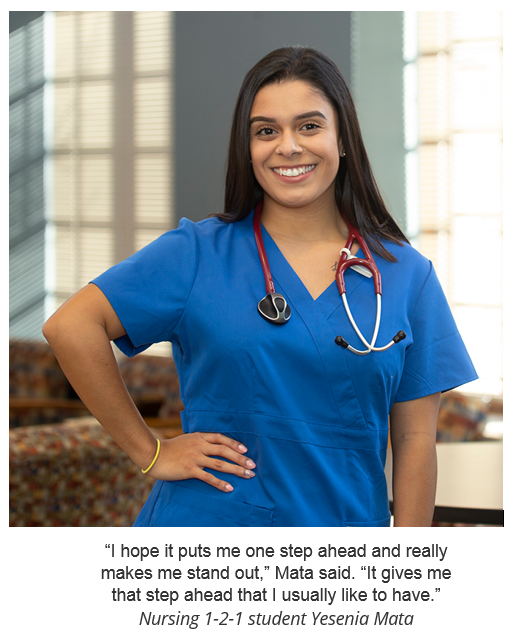National journal profiles innovative nursing program
Mount Mary’s Nursing 1-2-1 Program has been featured on the home page of Inside Higher Ed, highlighting the public-private partnership that streamlines the pathway to a Bachelor of Science in Nursing.
This joint degree program between Mount Mary and two local technical colleges addresses the growing need for BSN nurses.
The Nursing 1-2-1 Partnership began last spring and is offered through the combined expertise and resources of Mount Mary University and Milwaukee Area Technical College and Waukesha County Technical College.
Students enroll into the Nursing 1-2-1 to obtain an Associate Degree in Nursing (ADN), licensure as a Registered Nurse, and seamlessly move to complete a Bachelor of Science in Nursing degree (BSN), all within four years.
Yesenia Mata is one of 47 students currently enrolled in the program. She said the program aligned with her desire to enter the field as a neonatal or pediatric nurse.
“I hope it puts me one step ahead and really makes me stand out,” Mata said. “It gives me that step ahead that I usually like to have. 
Mata, who grew up in Bay View, Wis., is currently in her first semester at Mount Mary and will transition to MATC for the next two years, all the while maintaining her status as a Mount Mary student. She said the structure of the program and the guidance of the faculty have eliminated her anxiety about moving through this ambitious program.“I know a lot of nurses who have been in the field for many years and are now just going for their BSN,” Mata said. “Getting it done right away will put me ahead of the game.”
“I was really nervous at first but I know everything I need will get done,” she said. “It’s been a very good experience and I’m doing very well. I feel super comfortable and the faculty has helped me not feel rushed,” she said.
Mount Mary’s Nursing 1-2-1 partnership has also been featured in the Milwaukee Journal Sentinel.
The Inside Higher Ed article cited the Wisconsin Center for Nursing Research estimating that Wisconsin will be facing a shortage of 20,000 nurses by 2035. Nationwide, there are about three million nurses, but the American Nurses Association contends the country will need to produce more than one million new registered nurses by 2022 to meet health-care needs.
In 2016, 54 percent of nurses held a bachelor's degree, according to the U.S. Census Bureau's American Community Survey.
The article also stated that the National Academy of Medicine, formerly the Institute of Medicine, published a report in 2010 recommending the percentage of nurses in the field with a bachelor's degree increase from 49 percent to 80 percent by 2020.
Jenny Landen, dean of the School of Health, Math and Sciences at Santa Fe Community College in New Mexico, said the dual-degree partnerships is a model to help alleviate the pending shortage.
“When community colleges and universities partner, we can raise the number of available bachelor’s degrees … it’s a win-win,” Landen told Inside Higher Ed.